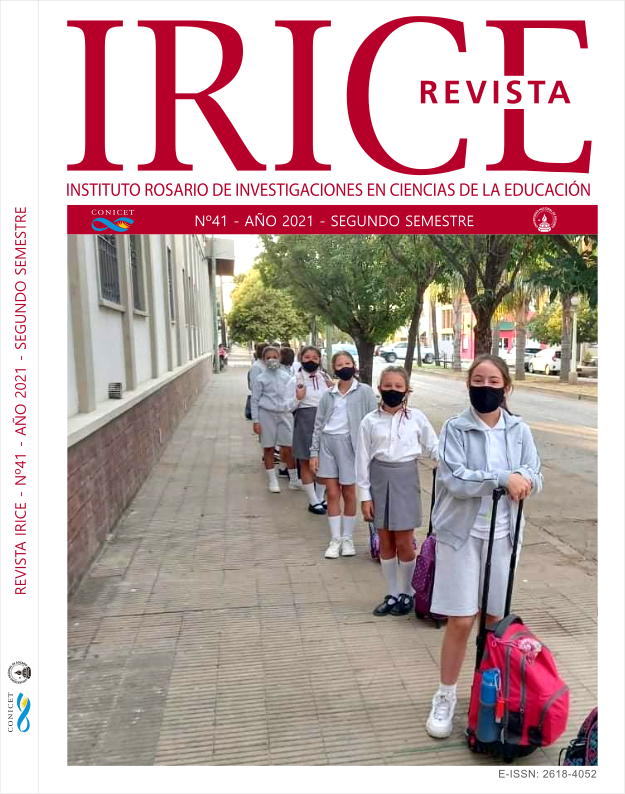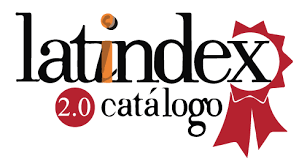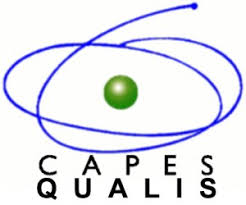The survey and an emerging pedagogical relationship in higher education
A cross-case analysis of Argentina and Sweden in COVID-19 isolation context
DOI:
https://doi.org/10.35305/revistairice.vi41.1445Keywords:
pandemic, pedagogical relationship, higher education, survey, socio-materialityAbstract
The closure of educational institutions in response to the pandemic produced by COVID-19 has generated an intense debate over the teaching methods of contemporary societies. In the higher education sector, the analog/digital ensemble reflected in the conflation of the “forced virtualization” with the social isolation generates a new sociotechnical entity. In this context, the focus is put on surveying the students. Online surveys are an element of the asynchronous platforms for teaching and learning. Besides, there are specific applications that are free and provide the teachers with the ability to apply and process large amounts of information about their students quickly.
The present cross-case analysis in two countries: Sweden (n=34) and Argentina (n=88), explores via an online survey, the students’ experiences of studying at the university during the pandemic. These two countries opted to virtualize higher-level activities although they followed different sanitary policies. This work explores the pedagogical relationships that emerge during the first months of the pandemic. The analysis of the students’ responses is grounded in an interpretive perspective in education, and a qualitative methodology. Taking a socio-material lens of such experiences, the analysis identifies material and motivational conditions of an emerging pedagogical relationship from the students’ perspectives in the contemporary context.
Downloads
References
Aristovnik, A., Keržič, D., Ravšelj, D., Tomaževič, N., & Umek, L. (2020). Impacts of the COVID-19 pandemic on life of higher education students: A global perspective.
Sustainability, 12(20), 8438. https://doi.org/10.3390/su12208438
Arora, A., & Srinivasan, R. (2020). Impact of Pandemic COVID-19 on the Teaching-Learning Process: A Study of Higher Education Teachers. Prabandhan: Indian Journal of Management, 13(4), 43-56. doi:10.17010/pijom/2020/v13i4/151825
Asociación Gremial Docente de la Universidad de Buenos Aires (30 de marzo de 2020). AGD ante el anuncio de comienzo lectivo en abril. Recuperado de https://listas.exactas.uba.ar/pipermail/general_patmo/2020-March/000213.html
Banco Mundial (2020). PIB per cápita (US$ a precios actuales) Argentina-Suecia. Recuperado de https://datos.bancomundial.org/indicador/NY.GDP.PCAP.CD?locations=SE
Castañeda, L., & Selwyn, N. (2018). More than tools? Making sense of the ongoing digitizations of higher education. International Journal of Educational Technology in Higher Education, 15. https://doi.org/10.1186/s41239-018-0109-y
Cerratto Pargman, T. (2021). Enseñar en Tiempos de Pandemia: Cuatro ejes para reflexionar sobre las prácticas pedagógicas emergentes en la universidad. En E. J Rico (Comp.), Actas del 4to. Encuentro de Interfaces de Conocimiento. Tecnologías aplicadas a la enseñanza, a la construcción de conocimientos y de discursos sociales en cuarentena COVID-19. Ciudad Autónoma de Buenos Aires: SEUBE-FILO-UBA.
Cerratto Pargman, T., & Jahnke, I. (Eds.) (2019). Emergent practices and material conditions in learning and teaching with technologies. New York: Springer.
Cerratto Pargman, T., Knutsson, O., & Karlström, P. (2015). Materiality of Online Students’ Peer-Review Activities in Higher Education. En O. Lindwall, P. Häkkinen, T. Koschman, P. Tchounikine & S. Ludvigsen, (Eds.), Exploring the Material Conditions of Learning: The Computer Supported Collaborative Learning (CSCL) Conference 2015 (Vol. 1). Gothenburg: The International Society of the Learning Sciences.
Czerniewicz, L., Agherdien, N., Badenhorst, J., Belluigi, D., Chambers, T., Chili, M.,…Wissing, G. (2020). A Wake-Up Call: Equity, Inequality and Covid-19 Emergency Remote Teaching and Learning. Postdigital Science and Education, 2, 946-967.
Decreto de Necesidad y Urgencia N° 297/2020. Aislamiento Social Preventivo y Obligatorio. 19 de marzo de 2020. Argentina. https://www.boletinoficial.gob.ar/detalleAviso/primera/227042/20200320
Del Valle, D., Perrotta , D., & Suasnábar , C. (2021). La universidad argentina pre y post pandemia: acciones frente al Covid-19 y los desafíos de una (posible) reforma. Integración Y Conocimiento, 10(2), 163-184. Recuperado de https://revistas.unc.edu.ar/index.php/integracionyconocimiento/article/view/32404
Dussel, I. (2011). Aprender y enseñar en la cultura digital. Documento básico. Buenos Aires: Fundación Santillana.
Dussel, I., & Trujillo Reyes, B. F. (2018). ¿Nuevas formas de enseñar y aprender? Las posibilidades en conflicto de las tecnologías digitales en la escuela. Perfiles Educativos, 40(Especial), 142-178. https://doi.org/10.22201/iisue.24486167e.2018.Especial.59182
Engeström, Y. (2001). Expansive learning at work: Toward an activity theoretical reconceptualization. Journal of education and work, 14(1), 133-156.
García Aretio, L. (1999). Historia de la educación a distancia. RIED. Revista Iberoamericana de Educación a Distancia, 2(1), 8-27. https://doi.org/10.5944/ried.2.1.2084
Gourlay, L., & Oliver, M. (2018). Student engagement in the digital university: Sociomaterial assemblages. New York: Routledge.
Green, J. K., Burrow, M., & Carvalho, L. (2020). Designing for Transition: Supporting Teachers and Students Cope with Emergency Remote Education. Postdigital Science and Education, 2, 906-922. https://doi.org/10.1007/s42438-020-00185-6
Haas, C. (1996). Writing Technologies. Studies on the Materiality of Literacy. New York: Routlege.
Hodges, C., Moore, S., Lockee, B., Trust, T., & Bond, A. (2020). The Difference Between Emergency Remote Teaching and Online Learning. Educause Review. Recuperado de https://er.educause.edu/articles/2020/3/the-difference-between-emergency-remote-teaching-and-online-learning
Jewitt, C., Bezemer, J., & O'Halloran, K. (2016). Introducing Multimodality. London: Routledge.
Landau, M. (2020) Después del terremoto, la clase en Zoom. Technos Magazine, 8. Recuperado de http://technosmagazine.com.ar/8aprendeb.html
Maydiantoro, A. A., Winatha, I. K., Riadi, B., Hidayatullah, R., Putrawan, G. E., & Dzakiria, H. (2020). (Emergency) Online Remote Learning in Higher Education Institutions during COVID-19 Crisis: Students' Perception of the Situation. Universal Journal of Educational Research, 8, 6445-6463.
Mishra, L., Gupta, T., & Shree, A. (2020). Online teaching-learning in higher education during lockdown period of COVID-19 pandemic. International Journal of Educational Research Open, 1, 100012. https://doi.org/10.1016/j.ijedro.2020.100012
Oliveira, L., Mesquita, A., Sequeira, A., & Oliveira, A. (2021). Emergency Remote Learning During COVID-19: Socio-educational Impacts on Portuguese Students. Educating Engineers for Future Industrial Revolutions, 1328, 303-314.
Paschal, M. J., & Mkulu, D. (2020). Online Classes during COVID-19 Pandemic in Higher Learning Institutions in Africa. Global Research in Higher Education, 3(3), 1-20. https://doi.org/10.22158/grhe.v3n3p1
Pokhrel, S., & Chhetri, R. (2021). A literature review on impact of COVID-19 pandemic on teaching and learning. Higher Education for the Future, 8(1), 133-141.
Rabardel, P. (1995). Les hommes et les technologies. Une approche cognitive des instruments contemporains. Paris: Armand Colin.
Säljö, R. (2010). Digital tools and challenges to institutional traditions of learning: Technologies, social memory and the performative nature of learning. Journal of Computer Assisted Learning, 26, 56-64.
Sørensen, E. (2009). The materiality of learning: Technology and knowledge in educational practice. Cambridge University Press.
UNESCO-IESALC (2020). Hacia el acceso universal a la educación superior: tendencias internacionales. Recuperado de https://www.iesalc.unesco.org/wp-content/uploads/2020/11/acceso-universal-a-la-ES-ESPANOL.pdf
Downloads
Published
How to Cite
Issue
Section
License
Copyright (c) 2022 Mariana Landau, Teresa Cerrato Pragman

This work is licensed under a Creative Commons Attribution-NonCommercial-ShareAlike 4.0 International License.
Aquellos autores/as que tengan publicaciones con esta revista, aceptan los términos siguientes:
- Los autores/as conservarán sus derechos de autor y garantizarán a la revista el derecho de primera publicación de su obra, el cuál estará simultáneamente sujeto a la Licencia Creative Commons Reconocimiento-NoComercial-CompartirIgual 4.0.
- Los autores/as podrán adoptar otros acuerdos de licencia no exclusiva de distribución de la versión de la obra publicada (p. ej.: depositarla en un archivo telemático institucional o publicarla en un volumen monográfico) siempre que se indique la publicación inicial en esta revista.
- Se permite y recomienda a los autores/as difundir su obra a través de Internet (p. ej.: en archivos telemáticos institucionales o en su página web) antes y durante el proceso de envío, lo cual puede producir intercambios interesantes y aumentar las citas de la obra publicada. (Véase El efecto del acceso abierto).




















